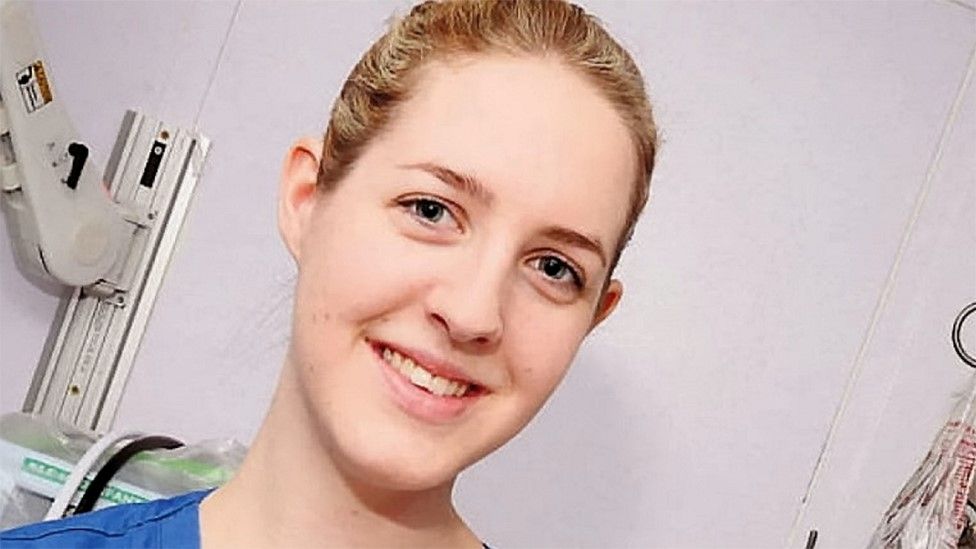Early one morning in July 2018, Lucy Letby was led away from her home in handcuffs after being arrested for the first time.
The neonatal nurse, 28 at the time, was to be questioned about truly unthinkable crimes that, upon conviction, would make her the UK’s most prolific child serial killer in modern times.
Her arrest followed a painstaking two-year investigation by Cheshire Police that, at its height, involved nearly 70 officers and civilian staff.
The sole focus of Operation Hummingbird was to investigate the alarming and unexplained rise in deaths and near-fatal collapses of premature babies in the Countess of Chester Hospital’s neonatal unit.
Within hours, news of Letby’s arrest was making headlines around the world.

Baby serial killer Lucy Letby
- Nurse Lucy Letby guilty of murdering seven babies
- Doctors’ warnings ignored as Letby killed more babies
- ‘Letby took everything from us’ – twins’ parents
- Watch moment as police arrest nurse

She was initially released on police bail but was subsequently arrested twice more and then ultimately charged in November 2020.
Since October, the now 33-year-old has been on trial at Manchester Crown Court, accused of murdering seven babies and attempting to murder 10 others between June 2015 and June 2016.
She steadfastly denied all of the 22 charges against her but was found guilty of seven counts of murder and seven of attempted murder, involving six babies.
Letby was acquitted on two counts of attempted murder while jurors were unable to reach verdicts on six further attempted murder charges.
The jury of seven women and four men had deliberated for more than 110 hours after hearing nine months of harrowing evidence.
But what have we learned about the woman who murdered and attempted to kill babies she was trusted to care for?

Letby was born on 4 January 1990 and grew up in Hereford with her mother and father, John and Susan, who since October have watched their daughter’s trial unfold from the public gallery.
She attended a local school and sixth-form college, selecting subjects she believed would help her achieve her goals and aspirations.
“I have always wanted to work with children,” she told the jury, adding she had chosen A-levels “which would best support that career”.

BBC Action Line
This is a distressing case so if you, or someone you know, need help after reading about it, the details of organisations offering assistance can be found on the BBC Action Line website.

Letby, who was the first person in her family to go to university, studied nursing for three years at the University of Chester.
During her studies, she completed numerous work placements. The majority were based at the Countess of Chester Hospital, either on the children’s ward or the neonatal unit.
She qualified as a Band 5 nurse in September 2011 and went on to start working full-time at the hospital from January 2012 before qualifying to work with intensive care babies in the spring of 2015.
Letby told the court her workload from that time was “predominately” spent looking after the sickest babies on the unit.
She also revealed how she mentored five or six student nurses and estimated that she had cared for hundreds of new-born babies during 2015 and 2016.

In September 2016, Letby was officially informed in a letter from the Royal College of Nursing that she was under investigation over the deaths of babies.
Earlier that year, she had been removed from clinical duties and given a clerical role in the risk and patient safety office by hospital management.
At the time, she believed this was to check staff were competent to do their jobs and hoped to return to the job she loved.
But six years later Letby – who had no previous convictions, reprimands or cautions recorded against her – found herself sitting in the dock behind a glass screen as the prosecution labelled her a “calculating and devious” opportunist who “gaslighted” colleagues to cover her “murderous assaults”.

Her defence team argued the deaths and collapses were due to “serial failures in care” in the unit and she was the victim of a “system that wanted to apportion blame when it failed”.
During the trial, jurors were given a glimpse into Letby’s life outside of work, with her once-private WhatsApp and social media messages read to the court.
“I had quite an active social life,” she told the jury.
“I used to regularly attend salsa class, go out with friends, go on holidays with friends. Gym.”
She started to cry as pictures of her home – where she was first arrested – were shown to the jury.

Letby lived in staff accommodation at Ash House before moving to a flat in Chester for about six months.
She moved back into Ash House in June 2015 before moving into the house she bought on Westbourne Road, Chester, in April 2016.
A photo of a noticeboard in the kitchen was covered in pictures and letters and featured a poster, drawn by her godson, which read: “No.1 Godmother awarded to Lucy Letby”.
On her bed, she had Winnie the Pooh and Eeyore cuddly toys while a drawer in the living room contained various documents and medical notes for her two cats, named Tigger and Smudge.
Letby has been remanded in custody since November 2020 and has spent time in four different prisons.
Her trial has gripped readers from around the world, many unable to fathom how a neonatal nurse could carry out such heinous acts.

Why not follow BBC North West on Facebook, Twitter and Instagram? You can also send story ideas to [email protected]
Related Topics
- Hereford
- Chester
- Lucy Letby
Related Internet Links
-
HM Courts & Tribunals Service
